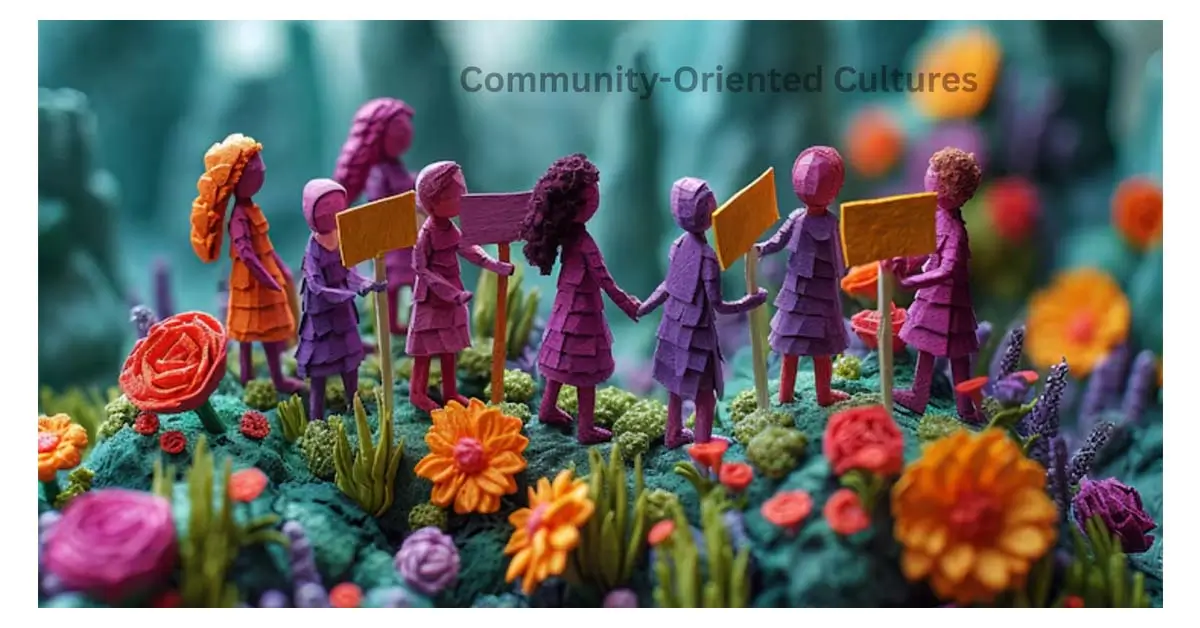Discover how integrating education and spirituality builds strong character, nurtures values, and connects learning with compassion and purpose.
Thank you for reading this post, don't forget to subscribe!In today’s society, obtaining a degree, starting a profession, and achieving financial stability are all made possible by education. Academic success is vital, but spiritual growth is just as important.
The Role of Education and Spirituality in Building Character
Merging education with spirituality nurtures the mind, heart, and soul holistically.
When we integrate education and spirituality, learning extends beyond books and classrooms; it becomes a journey of character formation, moral consciousness, and inner peace.
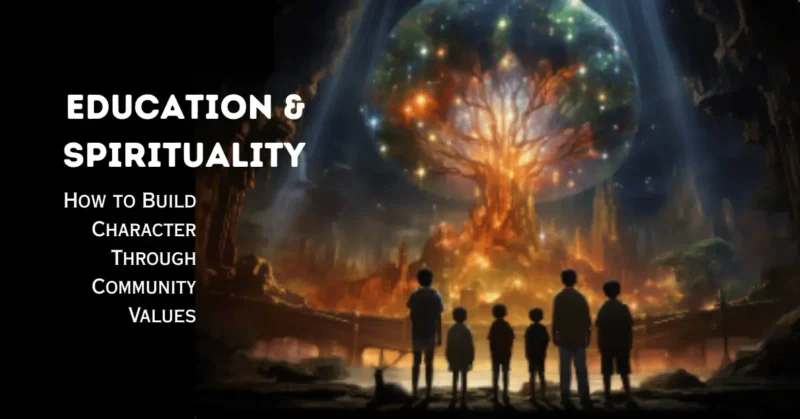
In this article, we’ll explore spiritual values in education, the impact of community on character, and why a balanced approach supports individuals and society. Let’s begin by considering why education feels incomplete without spirituality.
Why Education Without Spirituality Feels Incomplete
Traditional education focuses on building intellectual capacity but often neglects emotional and moral intelligence. This creates individuals who may be skilled in knowledge but lack empathy, ethics, and purpose.
Without spirituality, education risks becoming mechanical — producing achievers rather than compassionate leaders.
Spirituality brings meaning and mindfulness back into learning. It helps students connect their actions with higher values such as truth, kindness, and service. When education and spirituality are combined, learners not only excel academically but also develop inner strength, resilience, and integrity.
As the Dalai Lama once said, “When educating the minds of our youth, we must not forget to educate their hearts.” Education should cultivate both the intellect and the soul.
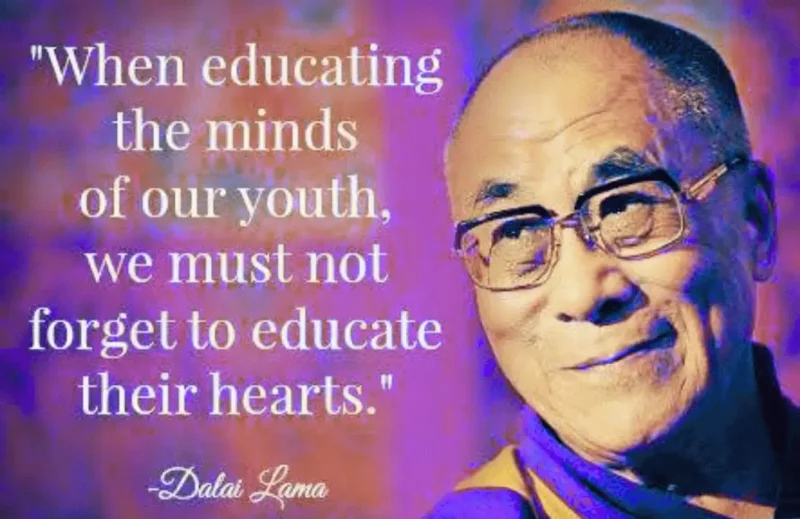
Key benefits of integrating education and spirituality include:
- Enhanced emotional intelligence and empathy
- Improved focus and mindfulness in learning
- Greater sense of purpose and social responsibility
- Development of integrity, humility, and respect
The Role of Community in Character Formation
Learning Beyond the Classroom Walls
Character is not built in isolation; it grows within a community. When students engage with society—through service, volunteerism, or cultural exchange—they apply their learning to real-life experiences.
Education and spirituality find their true meaning when knowledge serves others.
Community-based learning encourages responsibility, teamwork, and compassion. For example, programs like service-learning or youth mentorship blend education with moral action.
Students not only gain skills but also understand the value of empathy and cooperation.
Shared Values That Strengthen Collective Growth
Communities thrive on shared values—respect, honesty, tolerance, and kindness. These values are the living expression of spirituality in daily life.
Through shared rituals, traditions, and interactions, young people learn that success is not just personal achievement but also contribution to the greater good.
When schools and communities collaborate, education and spirituality reinforce one another—shaping minds and uplifting hearts. This foundation allows us to consider how these principles can be integrated into modern education systems.
Integrating Spirituality into Modern Education Systems
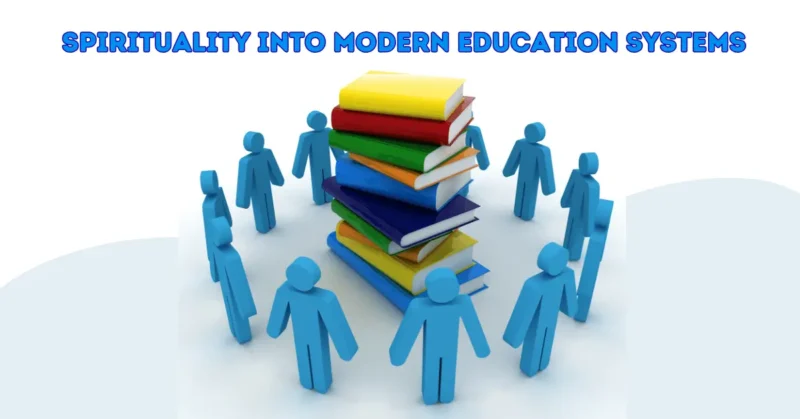
Spiritual awareness brings needed balance to fast-paced, technology-driven education. Integrating these elements in schools isn’t about religion, but about nurturing universal values and self-awareness.
Mindfulness and Meditation in Schools
Mindfulness practices help students manage stress, improve concentration, and cultivate empathy. Many schools around the world are now introducing meditation or quiet reflection periods during the day. This simple inclusion supports mental well-being and builds emotional resilience.
When students learn to pause, breathe, and observe their inner world, they become more grounded and aware—a crucial foundation for ethical living. Such practices reflect the beautiful harmony between education and spirituality in action.
Moral and Ethical Curriculum Design
An effective way to integrate spirituality is through value-based education. This could include teaching gratitude, honesty, compassion, and respect as part of the daily curriculum. Teachers can use storytelling, role-playing, and community projects to bring these values to life.
For example:
- Ethics lessons can involve real-world scenarios where students choose peaceful, honest solutions.
- Reflection sessions help learners connect personal choices with moral outcomes.
- Collaborative discussions encourage tolerance and appreciation of diversity.
Aligning moral education with academic learning helps students internalize key lessons: knowledge gains meaning when ethics guide its use, fostering growth in both mind and character.
This holistic approach equips learners for life beyond the classroom. This foundation leads us to explore how daily spiritual practices and community values further build character.
Building Character Through Spiritual Practice and Community Values
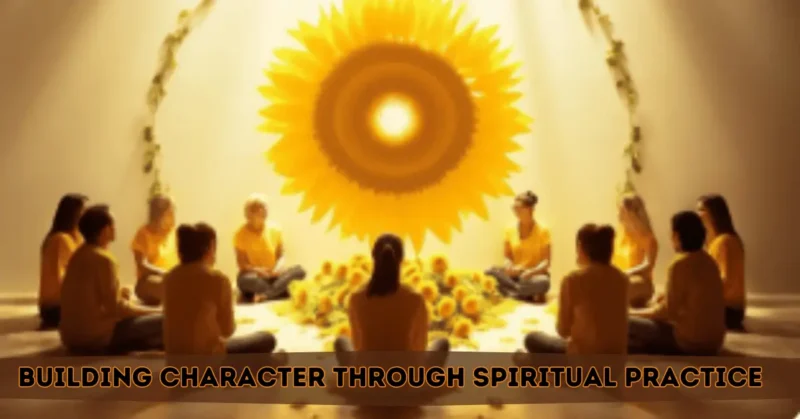
Daily Habits That Strengthen Inner Values
Character development begins with consistent, conscious habits. Encouraging students to maintain daily spiritual or reflective practices can deeply influence their mindset and behavior.
Examples include:
- Keeping a gratitude journal
- Practicing self-reflection at the end of the day
- Engaging in kindness challenges or acts of service
- Starting classes with a moment of silence or positive intention
These practices connect education and spirituality by turning values into lived experiences rather than just concepts. Students learn to find calm in chaos, humility in success, and purpose in progress.
The Educator’s Role as a Moral Mentor
Teachers are not just transmitters of knowledge; they are role models of compassion, patience, and wisdom. When educators embody spiritual principles such as empathy, truth, and service, students naturally mirror those values.
Teacher training can focus on mindfulness, emotional intelligence, and moral leadership, transforming both student learning and the overall classroom environment.
Thus, through teachers’ example, education and spirituality become inseparable forces for moral and emotional growth. To see these ideas in practice, let’s look at models of value-based education.
Case Studies: Successful Models of Value-Based Education
To see how education and spirituality come together in practice, consider the following examples:
- Montessori Education: Focuses on inner discipline, independence, and respect for others — rooted in moral and spiritual awareness.
- Waldorf Schools: Blend creativity, ethics, and mindfulness with academics, aiming to educate the “whole child” — head, heart, and hands.
- Faith-Based Institutions: Across various religions, many schools emphasize service, compassion, and reflection in their curricula.
- Community Learning Projects: Local initiatives that connect academic study with social service—encouraging empathy, leadership, and these institutions demonstrate that education merged with spirituality yields clear benefits- students develop not only critical thinking skills but also a deep sense of responsibility and purpose.
Let’s look ahead to how these ideas shape the future of education.
The Future of Education: Cultivating Mind, Heart, and Spirit Together
The future of education lies in balance—nurturing intellect, wisdom, empathy, and inner peace.
Technological advancement should not mean emotional disconnection. With the right approach, we can use digital tools to share mindfulness lessons, online community discussions, and value-based content that keeps education and spirituality relevant even in virtual spaces.
Future trends may include:
- Digital mindfulness apps for students
- Global networks for value-based education
- Emotional intelligence as a core subject
- Meditation and ethical leadership workshops
When the education system embraces spiritual intelligence alongside academic excellence, humanity moves toward a more peaceful, united world.
FAQs
Q. How does value education contribute to character building?
Value education helps students go beyond academics by shaping their thoughts, attitudes, and behavior. It fosters attributes that are necessary for leading an honest life, such as responsibility, empathy, and honesty.
When combined with education and spirituality, value education helps learners connect moral choices with inner awareness. This balance cultivates emotional strength and ethical clarity, guiding students to act with compassion and purpose in daily life.
Q. What is the connection between spirituality and education?
The connection between spirituality and education lies in nurturing both the mind and the soul. While education develops intellectual understanding, spirituality deepens self-awareness and moral wisdom.
When combined, they foster balance, helping students develop not only knowledge but also compassion, awareness, and responsibility. This integration prepares individuals to face life’s challenges with peace, integrity, and compassion, creating harmony between knowledge and inner growth.
Q. What is the integration of values in education?
Integrating values into education means incorporating moral and ethical principles into every aspect of learning, from subject matter to classroom behavior to community involvement. It ensures that knowledge is used for positive, constructive purposes.
When schools blend education and spirituality, students learn that success is meaningful only when guided by integrity, respect, and empathy. Such education shapes balanced individuals who value both achievement and humanity.
Q. What are spiritual values in education?
Spiritual values in education are universal principles that nurture inner peace and moral strength. These include love, truth, compassion, gratitude, humility, and self-discipline. Incorporating such values helps learners develop emotional stability and a sense of connection to others.
Through education and spirituality, students find meaning beyond grades or objectives. Understanding that genuine achievement lies in compassion, awareness, and humanitarian service.
Q. What are the five main values in education?
The five main values often emphasized in education are respect, responsibility, honesty, compassion, and cooperation. These form the foundation of moral growth and social harmony. When taught through the lens of education and spirituality, they move beyond rules to become lived experiences.
As a result, students learn how to treat others kindly, act honestly, take responsibility for their actions, and make a positive contribution to their communities and the world.
Q. What are the five aspects of integral education?
Integral education focuses on developing the physical, emotional, mental, psychic, and spiritual dimensions of a person. It aims for harmony between all parts of human nature rather than just intellectual achievement.
This method helps students maintain physical health, mental clarity, emotional equilibrium, and spiritual awakening by fusing education and spirituality. The result is a complete, conscious, and compassionate individual ready to serve society with wisdom and love.
Conclusion: Nurturing Souls While Educating Minds
The integration of education and spirituality represents more than just an educational reform—it’s a return to the true purpose of learning: self-discovery, compassion, and service.
When schools, families, and communities unite around shared values, we raise generations who are not only knowledgeable but also kind, responsible, and spiritually aware.
Key takeaways: Character is developed not just through study but by combining reflection, example, and engagement. By encouraging students to think critically, act compassionately, and lead meaningful lives, integrating education and spirituality helps create a society where goodness and wisdom drive progress.
Embrace the power of education and spirituality — start nurturing wisdom, compassion, and character in your community today.
Read more Healthy Living Blogs.
Yoj might love:


